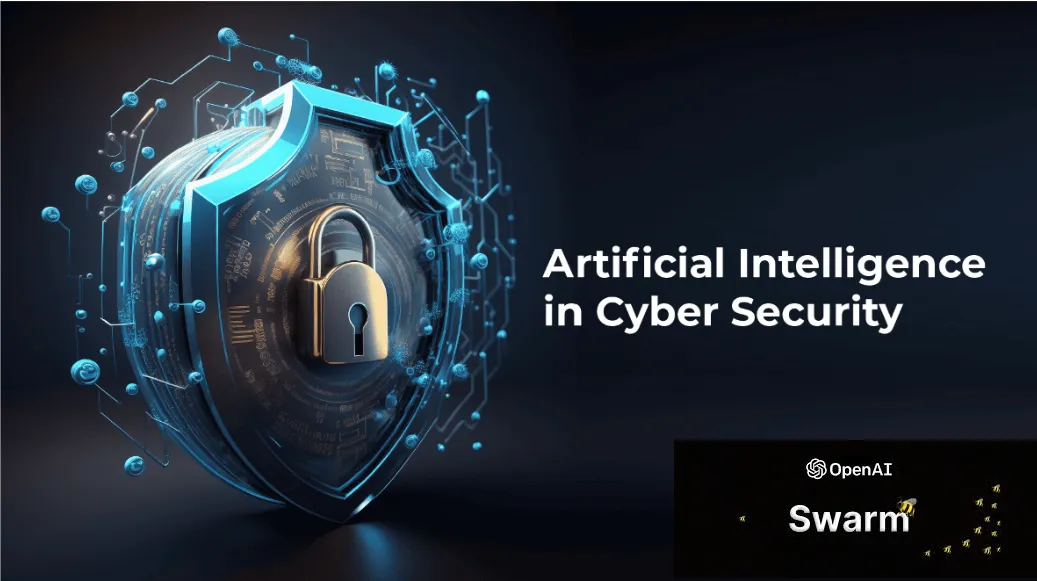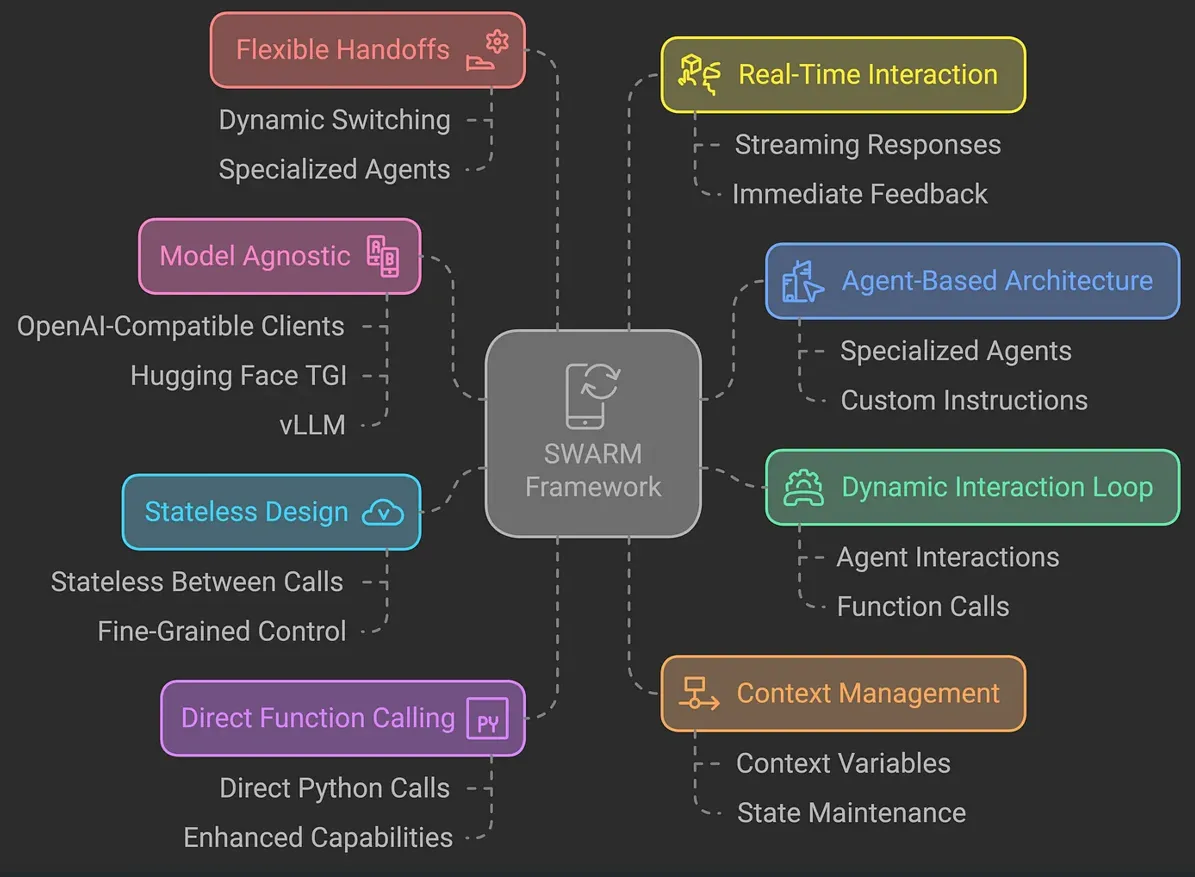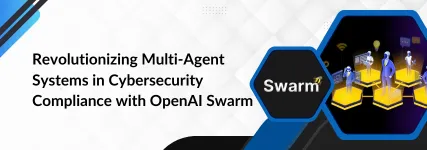As the digital landscape evolves, organizations across industries are facing increasingly complex cybersecurity challenges. With governments, industries, and global organizations mandating compliance with diverse cybersecurity frameworks, enterprises are required to navigate a maze of regulations that vary across geographies and sectors. This necessitates an intelligent, scalable, and automated solution to ensure compliance and streamline operations.

OpenAI’s Swarm framework presents a novel approach to multi-agent systems (MAS), offering a lightweight and modular solution for orchestrating specialized agents to address such challenges. This article explores the transformative potential of MAS in managing cybersecurity frameworks, delves into the unique features of OpenAI Swarm, and demonstrates how this innovative framework can solve real-world cybersecurity compliance issues.
The Growing Complexity of Cybersecurity Frameworks
Fragmentation Across Geographies
Every nation imposes its own cybersecurity regulations to safeguard critical infrastructure, data privacy, and information systems:
- United States: Frameworks such as NIST Cybersecurity Framework (NIST CSF) and HIPAA.
- European Union: GDPR and the NIS Directive.
- India: CERT-In guidelines and the IT Act.
- Australia: Essential Eight and ASD strategies.
Industry-Specific Requirements
Each sector also enforces specialized standards:
- Healthcare: HIPAA (U.S.), ISO 27799 (international).
- Finance: PCI DSS for payment security, Basel III for IT risk management.
- Energy: NERC CIP for power systems, IEC 62443 for industrial automation.
Dynamic and Overlapping Frameworks
The rapid evolution of cyber threats requires organizations to:
- Adapt: to frequent updates in regulations.
- Resolve: conflicts between overlapping requirements (e.g., GDPR vs. HIPAA on data privacy).
- Ensure compliance: with multiple frameworks simultaneously.
Operational Challenges
- High manual effort: and costs associated with audits and policy mapping.
- Complexity: in managing geographically dispersed operations.
- Need for rapid response: to emerging threats within regulatory boundaries.
These challenges highlight the need for an automated, modular system that simplifies compliance while ensuring precision and adaptability.
The Role of Multi-Agent Systems
Multi-agent systems provide a scalable approach to addressing fragmented cybersecurity frameworks by:
- Specializing: in specific tasks or domains, such as framework compliance or threat analysis.
- Collaborating: across agents to solve complex problems.
- Adapting: dynamically to new information and changes in the operational environment.
By dividing the workload among specialized agents, MAS enables organizations to:
- Automate: repetitive compliance tasks.
- Streamline: the resolution of complex, multi-framework challenges.
- Scale: operations efficiently as new frameworks or regulations emerge.
OpenAI Swarm: A Minimalist Framework for MAS
OpenAI Swarm simplifies the orchestration of lightweight, modular agents, providing a foundation for developing intelligent, multi-agent solutions.
Key Features of OpenAI Swarm:
- Lightweight Agents: Specialized agents with narrowly defined tasks to reduce computational overhead.
- Dynamic Interaction Loop: Seamlessly manages continuous agent interactions, function calls, and handoffs.
- Stateless Design: Offers transparency and fine-grained control while remaining stateless between calls.
- Context Management: Enables shared state across interactions using context variables.
- Direct Function Calling: Allows agents to call Python functions directly for deeper system integration.
- Flexible Handoffs: Agents can dynamically delegate tasks to other specialized agents.
- Real-Time Interaction: Supports streaming responses for immediate feedback.
- Model Agnostic: Compatible with any OpenAI-compatible client, including Hugging Face TGI or vLLM.
- Ease of Implementation: Minimal configurations enable quick deployment and simplified MAS development.

These features make Swarm an ideal framework for managing cybersecurity compliance.
A Practical Use Case: Cybersecurity Framework Compliance
Problem Statement
Organizations operating across multiple countries and industries face:
- A fragmented regulatory environment: with varying frameworks like NIST CSF, ISO 27001, and PCI DSS.
- Challenges in ensuring compliance: with overlapping and conflicting requirements.
- High operational costs and delays: in audits, policy implementation, and incident management.
Proposed Solution
A multi-agent system using OpenAI Swarm can address these challenges by deploying framework-specific agents:
- NIST CSF Agent: Focuses on the five functions—Identify, Protect, Detect, Respond, and Recover.
- ISO 27001 Agent: Covers Information Security Management Systems (ISMS) and compliance audits.
- PCI DSS Agent: Addresses payment card security requirements.
- General Agent: Provides guidance on generic cybersecurity best practices.
These agents collaborate dynamically to route queries, resolve conflicts, and provide actionable guidance tailored to specific frameworks.
Implementation of the Use Case
Collab Link
1. Import Necessary Libraries
Import required libraries and classes for agents and the Swarm client.
from swarm import Agent, Swarm
2. Specialized Agent Functions
Define the specific functionality for each agent. These functions handle tasks relevant to their assigned cybersecurity framework and manage handoffs when needed.
NIST CSF Agent Function
Handles NIST-specific queries or passes to the ISO agent if not relevant.
def handle_nist_task(context_variables, query):
"""
Handles NIST CSF-specific tasks or transfers to the next agent if not relevant.
"""
if "NIST" in query or "Identify" in query or "Recover" in query:
return f"NIST CSF Agent: Handling task related to '{query}' using NIST CSF."
return {
"handoff_to": iso_agent,
"context_variables": {"previous_agent": "NIST CSF Agent", **context_variables},
}
ISO 27001 Agent Function
Handles ISO-specific queries or passes to the PCI DSS agent if not relevant.
def handle_iso_task(context_variables, query):
"""
Handles ISO 27001-specific tasks or transfers to the next agent if not relevant.
"""
if "ISO" in query or "audit" in query or "ISMS" in query:
return f"ISO 27001 Agent: Handling task related to '{query}' using ISO 27001."
return {
"handoff_to": pci_agent,
"context_variables": {"previous_agent": "ISO 27001 Agent", **context_variables},
}
PCI DSS Agent Function
Handles PCI DSS-specific queries or provides a fallback response if not relevant.
def handle_pci_task(context_variables, query):
"""
Handles PCI DSS-specific tasks or provides a fallback response if not relevant.
"""
if "PCI" in query or "payment" in query or "credit card" in query:
return f"PCI DSS Agent: Handling task related to '{query}' using PCI DSS."
return "PCI DSS Agent: Unable to handle this query. Please clarify your request."
3. Define Specialized Agents
Use the functions defined above to create specialized agents for each framework.
NIST CSF Agent
nist_agent = Agent(
name="NIST CSF Agent",
instructions="You are a NIST CSF expert. Handle queries about Identify, Protect, Detect, Respond, and Recover.",
functions=[handle_nist_task]
)
ISO 27001 Agent
iso_agent = Agent(
name="ISO 27001 Agent",
instructions="You are an ISO 27001 expert. Handle queries about ISMS, audits, and compliance.",
functions=[handle_iso_task]
)
PCI DSS Agent
pci_agent = Agent(
name="PCI DSS Agent",
instructions="You are a PCI DSS expert. Handle queries about payment card security and compliance.",
functions=[handle_pci_task]
)
4. Define General Compliance Interface Agent
This is the starting point for all user queries. It delegates tasks to specialized agents as needed.
Transfer Functions for Handoffs
def transfer_to_nist():
"""Transfer the query to the NIST CSF Agent."""
return nist_agent
def transfer_to_iso():
"""Transfer the query to the ISO 27001 Agent."""
return iso_agent
def transfer_to_pci():
"""Transfer the query to the PCI DSS Agent."""
return pci_agent
Compliance Interface Agent
compliance_interface_agent = Agent(
name="Compliance Interface Agent",
instructions="You are a general compliance interface agent.
Handle user queries broadly and delegate to specialized agents when needed.",
functions=[transfer_to_nist, transfer_to_iso, transfer_to_pci]
)
5. Initialize Swarm Client
The Swarm client is initialized for handling agent interactions.
client = Swarm()
6. Processing Compliance Queries
This function manages the query processing lifecycle, starting with the Compliance Interface Agent and dynamically delegating tasks between agents.
def process_compliance_query(query, verbose=False):
"""
Process a compliance query starting with the Compliance Interface Agent.
The query will dynamically transfer between agents based on relevance.
"""
response = client.run(
agent=compliance_interface_agent,
messages=[{"role": "user", "content": query}],
context_variables={"query": query}
)
# Extract response details
final_response = response.messages[-1]["content"]
last_agent = response.agent.name
context_vars = response.context_variables
# Verbose output for debugging
if verbose:
print(f"Verbose Output:")
print(f"Query: {query}")
print(f"Last Agent Called: {last_agent}")
print(f"Context Variables: {context_vars}")
print("-" * 50)
return final_response
7. Test the System
Finally, test the implementation with a variety of queries.
queries = [
"What are the key audit requirements under ISO 27001?"
]
for query in queries:
print(f"Query: {query}")
print("Response:", process_compliance_query(query, verbose=True))
print("-" * 50)
Output

queries = [
"What encryption protocols should I use to comply with PCI DSS?"
]
for query in queries:
print(f"Query: {query}")
print("Response:", process_compliance_query(query, verbose=True))
print("-" * 50)
OUTPUT

Benefits of the Swarm-Based MAS
- Precision and Accuracy
- Framework-specific agents ensure that guidance aligns with regulations.
- Scalability
- New agents can be added for emerging frameworks or industry-specific requirements.
- Operational Efficiency
- Automated processes reduce manual effort and costs.
- Global and Industry Coverage
- MAS handles multi-country, multi-industry operations seamlessly.
Conclusion
OpenAI Swarm redefines how organizations can leverage multi-agent systems to address complex, fragmented challenges like cybersecurity compliance. By combining modular design, dynamic routing, and specialized expertise, Swarm delivers a scalable and efficient solution for navigating the ever-evolving regulatory landscape.
As cybersecurity threats and regulations continue to grow in complexity, frameworks like Swarm will play a pivotal role in empowering organizations to stay secure, compliant, and adaptive.
